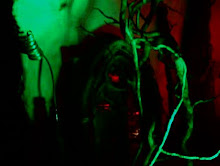Saturday, 18 July 2009
Poets Have It Easy...Part 2
Poets Have it Easy...Part 1
Friday, 17 July 2009
What’s a Poet Laureate for?
Much has been spoken about who should be – before a new one was appointed – or who should have been – whether now or in the past, the Poet Laureate. Questions have been asked about what the Laureateship is for, too. On Radio 4’s Question Time programme, people answered different things, some answers plainly implying that it was something cultural, but without any clearer idea why. One detailed answer was that it was about education and educating people about poetry. But in the outline which they sketched, this educating people amounted only to disseminating poetry in schools. And yet surely that is – apart from being, in part at least, what the laureateship has become – tantamount to saying this is something which we value for children, but not for adults/ourselves. That people should be introduced to it, only to forget about it later and not take it into adult life. But what is education for except to equip you with tools, either theoretical or practical to tackle the world later on?
If the idea of singing the praises of the ruling classes or commemorating state occasions as Wordsworth and Tennyson did, is no longer viable or desirable, then why not go further back to the history of poet as tribal cheerleader?
If we go, a long way back, to what are arguably the historical foundations for the idea of a laureateship, we are with the Anglo-Saxons and the Vikings, and the scops and skalds of the Dark Ages. These wandering poets and sometimes minstrels, had the job of not only spreading news throughout the kingdoms, of battles and deeds, but they were, in the words of Michael Alexander ‘the voice and memory of the tribe’. And if you wished for ‘a name that would never die beneath the stars’, you had to pay the poet! to spread your name and guard your fame. One idea of laureateship then, to have a modern take on the idea of the scop, is an idea that there is one poet – one person especially good at capturing the spirit of a particular place, climate and history, and singing not its praises, or indeed the praises of those who rule it (especially in the current political and social climate) but of why it is different, of what makes it special, of why out of all places it should indeed be visited and valued, or looked at in a special light. Not as a better or bigger or a richer country, but one with something still unique to offer an increasingly homogenised world.
So, to conclude, maybe the post should not be just about education, not just about showing why poetry matters, certainly not about cheering on rulers or armed conflicts, but making poetry about the nation itself, that matters by bringing to light the unique combinations of the country in question and makes people aware of that by its beauty. If the post was still honorary of course it would not matter how supposedly ‘accessible’ this poetry was either, because it would be about encapsulating a complex society, not the comparatively simple one of the scops. It would be about trying to fathom the rich and many-threaded skeins of what it means to be part of or live in England and Britain without either parochialism, xenophobia or absence of criticism. One poet that springs to mind, and one who would fully comprehend what it meant to inherit a post with a link, however far away and fragile, to the Dark Age scops, would be Geoffrey Hill. Although, thinking about it, perhaps he was offered it and unbeknown to us turned it down, dismissing it as requiring a media presence he wasn’t prepared to give…?
See also; http://latimesblogs.latimes.com/jacketcopy/2009/04/geoffrey-hill-the-poets-public-burden.html



